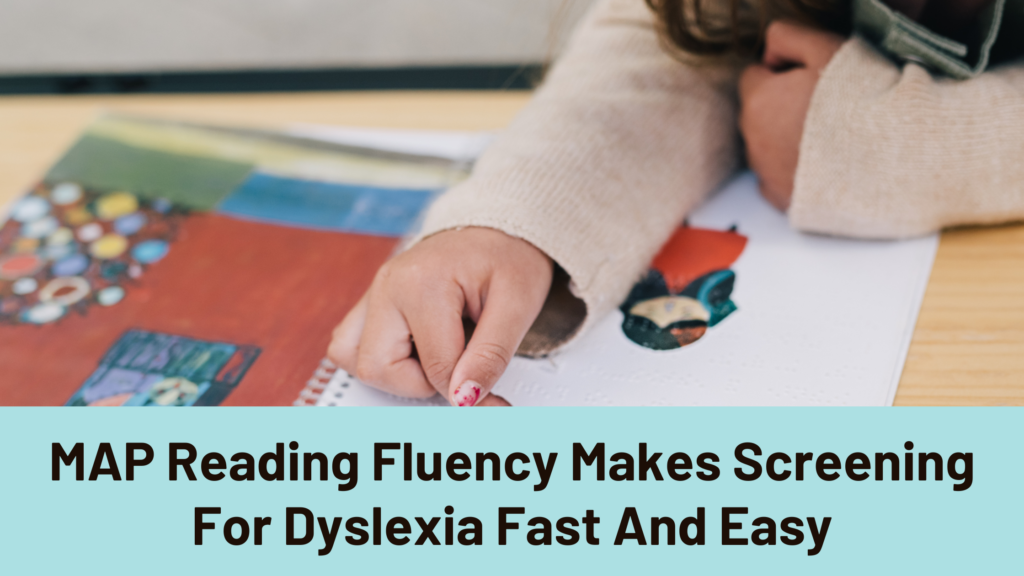
How Can an NWEA MAP Test Screen for Dyslexia?
As children begin learning to read and write, they often have trouble sounding out unfamiliar words, remembering words they have read before, and spelling words correctly. These challenges are also primary characteristics of dyslexia, a language-processing disability that affects one in every five children. Distinguishing between children with normal struggles and those that might benefit from more intervention or diagnosis is the role of a dyslexia screening tool.
So how do you distinguish the typical struggles of learning from a learning disability? NWEA’s MAP Reading Fluency test with a Dyslexia Screener can help parents and teachers determine when an early reader’s difficulty with learning to read would be helped by interventions targeting dyslexia.
How does the MAP Reading Fluency Dyslexia Screener help identify students with dyslexia?
The Dyslexia Screener is designed to identify students whose test performance suggests specific risk factors for dyslexia or other reading challenges. To assess these risk factors, the screener uses a predictive model that considers multiple literacy domains, a student’s grade level, and the time of year.
At-risk students will have a flag on their test report to alert parents or teachers that individual assessment or intervention should be considered. It’s important to remember that the MAP Reading Fluency Dyslexia Screener cannot diagnose dyslexia. A diagnosis of dyslexia can come only from a trained professional. The Dyslexia Screener helps teachers and parents discover that this assessment would be appropriate.
What grade levels is the MAP Reading Fluency Dyslexia Screener appropriate for?
The Dyslexia Screener is available for grades K-3 only. Other MAP Reading Fluency test types include Benchmark Tests for Pre-K through grade 5 and Progress Monitoring tests for grades K-5.
How is the MAP Reading Fluency Dyslexia Screener administered?
The Dyslexia Screener is based on the MAP Reading Fluency Benchmark test. Students complete the Foundational Skills assessment (the Benchmark test) along with a Rapid Automatized Naming (RAN) measure. Foundational Skills include areas such as phonics, comprehension, and sentence reading fluency. RAN asks students to name familiar objects and symbols, with no reading required. RAN is not based on literacy skills; it is a cognitive screening measure highlighting possible processing speed or memory difficulties that may impact reading fluency. The entire MAP Reading Fluency test with the Dyslexia Screener takes about 20 minutes.
My student has been flagged as having risk factors for dyslexia. What should I do next?
Early intervention can have a significant impact on future student success and enjoyment of learning. Many strategies for helping dyslexic students—like simplifying directions and maintaining routines—can be implemented to help every student, regardless of reading level. Parents and teachers may consider additional assessment by a dyslexia specialist with the expertise to diagnose a learning disability and identify interventions to address a student’s specific needs. A specialist may also recommend testing vision, hearing, or fine motor skills to get a bigger picture of a child’s learning challenges.
Is homeschooling appropriate for a dyslexic student?
Homeschooling parents may feel unsure about homeschooling a child with a learning disability, but many parents say the effort is worth it. The International Dyslexia Association’s fact sheet on homeschooling notes that there are challenges but many benefits, especially the opportunity to work at an individualized pace and tailor literacy activities to a student’s personal interests. Homeschooled students with dyslexia can have a robust, hands-on education that nurtures a love of learning while allowing reading skills to develop on a student’s own schedule with specialized learning strategies. Homeschooling parents can also get specialized training in methods like the Orton-Gillingham approach or the Lindamood-Bell program.
Plenty of resources exist for parents homeschooling a dyslexic child. This list from Raising Lifelong Learners includes ideas for parents, kids, gifted/2E students, and more.
Schedule a MAP Reading Fluency test
Homeschools, microschools, tutors, and small private schools can access the MAP Reading Fluency test with Homeschool Boss.
- Learn what to expect when testing with Homeschool Boss
- Read our clients’ rave reviews
- Book now!